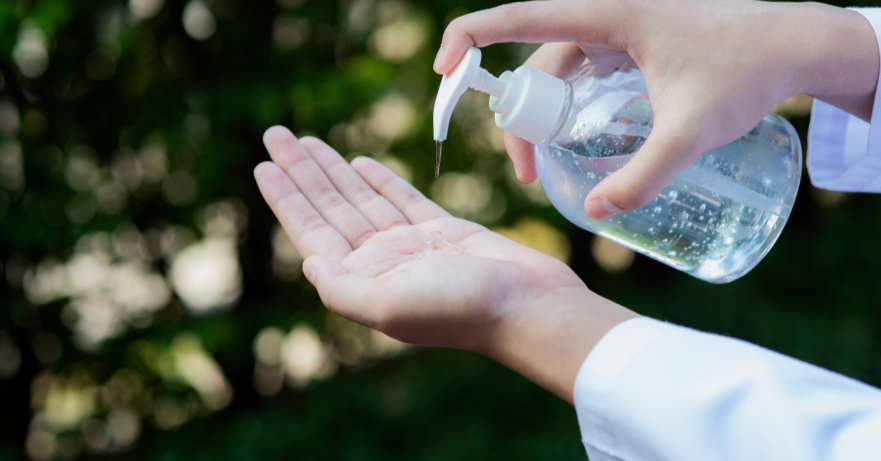Looking back at the past year, it is definitely safe to say that the majority of us most likely have used more hand sanitizer than ever before in our lives.
With the unforeseen event of the COVID-19 pandemic, hand sanitizer has gone from being in a surplus, to a shortage, and then back to having an ample amount resulting in there being excess production.
In fact, this excess in production led to an issue where companies were unable to reach the Canadian Health standards, and therefore were required to have their products recalled from the market.
Given that hand sanitizers are considered to be hazardous material due to their alcohol content, a large amount of hand sanitizer that did not pass the inspections had to be disposed of in a safe and environmentally-friendly way.
Why does hand sanitizer need to be disposed of correctly?
Hand sanitizing products with high alcohol concentration, which is usually considered to be between 60-95%, are much more effective at killing microorganisms that cause diseases (such as COVID-19) and are required to be disposed of very carefully.
Looking at the chemistry of the alcohol within hand sanitizers, the most common form of alcohol is ethanol, which can also be used as a solvent. Ethanol is known to be extremely effective at killing a range of bacteria and viruses; it is often a clear and colorless liquid that contains a strong taste.
When hand sanitizers were being produced and purchased in large amounts, but were not approved when inspected, individuals that had purchased the product were informed to return it to the provider immediately or preferably dispose of it as a waste. However, if that were not possible, they were advised not to under any circumstance throw it into the facility trash or flush it down the drain.
It was said that continuous usage of some of these hand sanitizers were resulting in dry skin, causing irritation, or cracking. Health Canada had created a list of products that were recalled, as they contained industrial-grade ethanol. The recall list includes Gel 700 hand Sanitizer, Walker Emulsions Hand Sanitizer, Eltraderm Hand Sanitizer, and Sanilabs Hand Sanitizer.
If you are looking to dispose of your hand sanitizer for any reason it is crucial that you dispose of it properly.
A common misconception people have is that alcohol can go down the drain. Unless the concentration of the alcohol is nonhazardous, you must dispose of your hand sanitizer correctly. In concentrations that are less than 24%, ethanol is said to be non-hazardous. Any alcohol with higher concentrations is not allowed to be diluted.
What is the hazardous waste process for hand sanitizer with Maratek Environmental?
- Once a customer gets in contact, Maratek Environmental requests a definition of the liquid waste, or used solvent waste. This allows us to determine the best way to recycle or dispose of the hazardous material.
- Once the waste is defined, Maratek will review and make sure it falls under ‘transportable waste’ within the MOECP certification so that we can bring it in for sample testing.
- Sample testing is the most effective way for our team to confirm whether your solvent waste is recyclable or disposable. This begins with the sample being added to a facility testing queue. It then goes through a distillation testing that separates the components. This gives our team of Chemical Specialists a chance to analyze the recovery performance.
- When it has been deemed acceptable for us to recycle, our team schedules a pickup within 30 days. The solvent handling division will drop it off at our waste management facility and start the distillation process.
- Depending on the solvent you are recycling, Maratek Environmental uses a recovery unit to separate the solvent from the undesirable component. Since most solvents contain a component with a lower boil point (Acetone, ketone, ethanol, etc..) the separation process is based on the mixture having a higher boiling point, that will then separate the used from the clean by vaporizing the undesirables out.
- Once the vapor is cooled and condensed, the left-over solvent is fully reusable to virgin quality standards.
- If disposal of liquid hazardous waste is required, Maratek Environmental will schedule a pickup within 30 days of the request, after the sample testing has been done.
- Once received, it will then be part of a thermal decomposition process, which allows you to be rid of the hazardous waste in a safe way.
The COVID-19 pandemic has had a great toll on many lives and businesses, but out of all of them, the hand sanitizer market was one of the most highly impacted markets. Within the past year, we have seen a huge increase in the sales of hand sanitizers like never before.
With many different companies attempting to join this market, the room for production mistakes grows, leading to the increase in disposal of inadequate products. When purchasing and utilizing hand sanitizers, it is important for us to ensure what we use meets the standards set by federal departments like Canada Health.
Are you interested in learning more about disposing hand sanitizer in Ontario? Contact Maratek Environmental today. We would love to help.

